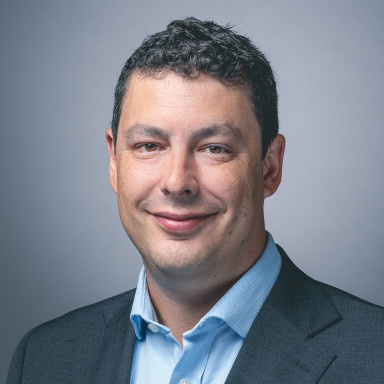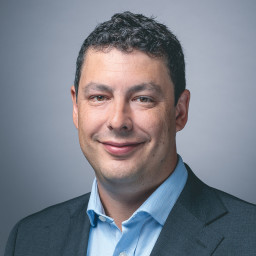We like the simple philosophy behind this trust, with the potential for long-term growth and a focus on preserving wealth in weaker markets
Manager Sebastian Lyon is part-owner of Troy so we think he's incentivised to perform
He also has a good team of analysts around him to provide support on this trust
How it fits in a portfolio
Rather than trying to shoot the lights out, Personal Assets Trust aims to grow investors' money steadily over the long run, while limiting losses when markets fall. It tries to experience fewer ups and downs than the broader global stock market or a portfolio that's mainly invested in shares.
As a result, it could form the foundation of a broad investment portfolio, bring some stability to a more adventurous portfolio, or provide some long-term growth potential to a more conservative portfolio.
Manager
Sebastian Lyon took over management of Personal Assets Trust in March 2009. He's managed the trust using the same investment philosophy that was founded when Troy Asset Management started in 2000. He’s also managed the Troy Trojan Fund since its launch in 2001 – this is an open-ended fund that is invested similarly to the Personal Assets Trust. However, even though the two are similar, they will perform differently at times. Investors in the trust should be aware that closed-ended funds can trade at a discount or premium to the net asset value (NAV). Unlike many other trusts, the manager looks to limit the size of the discount or premium, which typically helps to keep the share price close to the NAV.
Lyon is also Chief Investment Officer of Troy Asset Management. This position takes up some of his time, but he's previously handed over some of the day-to-day company management responsibilities to capable colleagues. This leaves him to focus more of his time on investment management. Lyon is supported by Charlotte Yonge as assistant manager on the trust. Yonge carries out analysis across a range of assets and works closely with Lyon. Overall we think Troy is home to a stable investment team.
Process
Lyon and Yonge like to keep things simple. They aim to shelter investors' wealth just as much as grow it.
To do this, the trust is constructed around four 'pillars'. The first contains large, established companies Lyon thinks can grow sustainably over the long run, and endure tough economic conditions. He has tended to focus on companies based in developed markets, such as the US and UK. This includes some of the world's best-known companies with highly recognisable brands, such as Unilever, Visa, Nestle, Microsoft and Alphabet-the parent company of Google. The manager does have the freedom to invest in higher-risk smaller companies as well.
Since April 2023, the amount of the trust invested in shares has increased from 24.0% to 27.5% at April 2024, with a focus on companies listed in the United States. The increase in the amount invested in shares is largely due to adding Heineken to the trust. Lyon and Yonge have been following the company for some time and have taken the opportunity to add it to the trust following some weakness in the share price.
The rest of the trust is made up of investments that could bring some stability to the portfolio during more difficult markets. The second pillar is invested in bonds. 39.8% of the trust is currently invested there, with the bulk of this held in US index-linked treasuries.
The third pillar consists of gold-related investments, including physical gold, and accounts for 12.5%. Gold often acts as a safe haven during times of uncertainty, and the manager has held gold in the trust since introducing the pillar approach in 2009. The final pillar is ‘liquidity’, where 20.4% of the trust is held. This is made up of a combination of UK Treasury bills, government bonds and cash. This provides important shelter when markets stumble, but also a chance to invest in other assets quickly when opportunities arise.
The biggest change to the trust over the year has been the decrease in the liquidity bucket, which has come down from 31.0% in April 2023.
While the trust contains a diverse range of investments, it is concentrated. This approach means each investment can contribute significantly to overall returns, but it can increase risk. The manager has the flexibility to use derivatives and gearing (borrowing to invest) which, if used, adds risk.
Culture
We like that Troy's fund managers are dedicated to the same investment philosophy that was established two decades ago. The group has always been clear about the way its range of funds are managed, and the managers don't stray into overly complicated areas of investment markets. Wealth preservation is key, and each manager adheres to this mantra.
Lyon is a part-owner of Troy Asset Management, so we believe he's incentivised to perform, and for his funds and the business to do well over the long term. Other senior members of the group also own a part of the business, and we think this contributes to the stability and loyalty of the team. While Troy is home to a small, close-knit team of investors, the group has recruited more junior members over the years to boost resource and ensure the funds are left in good hands as and when more senior members retire. Despite the team’s growth we think Troy has remained a very collegiate unit with all members able to have input.
In March 2024 it was confirmed that Lincoln Peak Capital, a private equity firm, had purchased a minority stake in Troy Asset Management. They have purchased their stake in the company from the Weinstock family, who previously were the largest external shareholder of the firm. It is not expected that this will have an impact on how Personal Assets Trust is managed and as part of the transaction, employees have increased their overall ownership of the company.
ESG integration
Troy has been formally incorporating environmental, social and governance (ESG) matters into its investment processes for several years but it came from a very strong starting point. The firm’s always been focused on the sustainability of returns and is a long-term investor. In recent years Troy’s investment team has formalised the way they incorporate ESG and the way they talk to investors about it. ESG is integrated using a materiality-based approach, meaning the managers focus on the issues they deem to be most material. They also have access to third party ESG data and research. How analysts and fund managers engage with ESG, and the overall quality of their research, is considered when calculating their incentivisation packages.
Engagement and voting are the responsibility of the investment team. All votes are discharged, and usually cast in favour of management proposals unless the team believes investors’ interests are better represented by abstaining or voting against management. Their preferred course of action is to have dialogue with management ahead of casting a vote against. The firm provides a proxy voting portal where investors can see every vote exercised, although no rationales are provided. That said, Troy publishes a summary of its ‘significant’ votes in its annual ‘Engagement and Voting Disclosure’ report, along with rationales for voting both in favour and against proposals. They also produce a quarterly Responsible Investment report, which includes voting and engagement statistics and case studies.
Overall, we are confident that ESG risks are suitably considered as part of the investment process at Troy.
Cost
The trust's ongoing charge for the year to 30 April 2024 was 0.65%. Investors should refer to the latest annual reports and accounts and Key Investor Information for details of the risks and charging structure.
If held in a SIPP or ISA the HL platform fee of 0.45% (capped at £200 for a SIPP and £45 for an ISA) per annum also applies, except in a Junior ISA, where no platform fee applies.
As investment trusts trade like shares, both a buy and sell instruction will be subject to the HL share dealing charges within any Hargreaves Lansdown account.
Performance
Since Lyon took over management of the trust in 2009 to the end of June 2024 it has grown 167.23%*. We think this is an attractive return for a more conservative trust, and is well ahead of the UK Retail Prices index of inflation. Remember past performance isn't a guide to future returns and you could get back less than you invest.
The trust hasn't done as well as the broader UK stock market, as measured by the FTSE All Share Index, which the trust uses as its main comparator. We expect the trust to perform in this way though. Even with the market setback in 2020, global stock markets have risen strongly over the past decade, and the trust's more cautious approach means it's been less able to keep up with rapidly rising markets.
Avoiding large losses has been an important characteristic of the trust and it has tended to come into its own, holding up well in weaker markets. We saw this in early 2020 when global markets stumbled amid the coronavirus outbreak.
Over the 12 months to 30 April 2024, the trust’s share price went up in value, returning 2.1%. The trust’s Net Asset Value (NAV) rose less, gaining 1.3% over the period. However, both rose less than the FTSE All Share’s 7.5% gain. While the investments in shares added value overall, some of them detracted from performance for the trust. Diageo, the British alcoholic beverage company, and Nestle, the Swiss food and drink conglomerate were the worst performing shares in the fund.
The other shares in the trust more than compensated for this, with Alphabet, the parent company of Google, and American Express, the US financial services company, adding the most value.
Gold was also a notable positive for the trust over the period, with the yellow metal seeing a notable increase in price, particularly towards the end of 2023 and start of 2024.
At the time of writing, the trust yield’s 1.15% and is trading at a discount to NAV of 0.72%. Income isn’t guaranteed, and yields aren’t a reliable indicator of future income. This trust has a policy of buying and issuing shares so that the value of the shares does not move significantly away from the value of the underlying assets. This means that the premium or discount to NAV can be expected to be small over time.
Annual percentage growth
30/06/2019 To 30/06/2020 | 30/06/2020 To 30/06/2021 | 30/06/2021 To 30/06/2022 | 30/06/2022 To 30/06/2023 | 30/06/2023 To 30/06/2024 | |
|---|---|---|---|---|---|
Personal Assets Trust | 5.60% | 9.00% | 2.19% | -1.43% | 6.32% |
FTSE All Share | -12.99% | 21.45% | 1.64% | 7.89% | 12.98% |
UK RPI | 1.07% | 3.86% | 11.84% | 10.71% | 2.90% |


